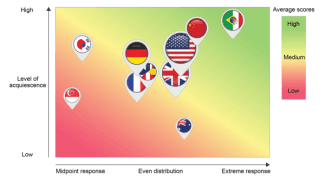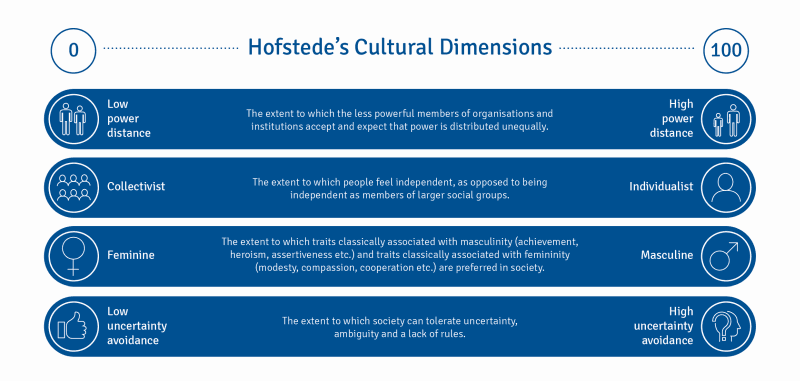As firms from around the globe seek to internationalise their operations, they are increasingly having to enter business relationships with customers and companies which belong to different culture groups. As such, marketing managers must be wary of the cultural differences that are present in these new markets if they desire to make a success of these business relationships. While research into the drivers of b2b relationships is thorough and wide-reaching, the impact that national culture may have on the b2b relationship is one which has not been as explored in such detail.
Culture As An Independent Variable
The first real attempt to understand culture as a set of variables was by the Dutch social psychologist and former IBM employee, Geert Hofstede. Hofstede defined national culture as ‘the collective programming of the mind which distinguishes the members of one group from another’. This ‘programming’ influences the thoughts and values of individuals throughout all aspects of their life, including the business decisions they make. The result of Hofstede’s attempts to turn these intangible aspects of culture into both tangible and measurable variables was his Cultural Dimensions Framework. The below table gives a brief explanation of the four original cultural dimensions that formed the basis for much of the research. This blog post will not attempt to explain the intricacies, merits and demerits of Hofstede’s work but will instead focus on two of the most influential dimensions, Individualism/Collectivism (IDV) and Power Distance (PDI).
Individualism / Collectivism (IDV)
Let us first look at the Individualist-Collectivist cultural dimension and its impact upon trust, a vital aspect of any b2b relationship. In Individualistic cultural groups, members feel independent and people’s self-image revolves around “I” and the immediate family. In Collectivist societies, however, there is a greater degree of interdependence between members of society and members often refer to “We” and the wider social group such as an extended family or cultural group.
Research has found that in highly Individualistic societies such as the US, UK and Germany, individuals are much more trusting of external agents and will more willingly enter a business relationship than those from highly Collectivist societies, such as China, Japan and South Korea. Western companies may therefore find it more difficult to form an initial business relationship with companies which are based in collectivist societies. However, while initially collectivists may be unwilling to trust external agents, overtime a much stronger and enduring relationship may develop and indeed be stronger within these societies. Indeed, our own experience of carrying out research in Japan, a collectivist society with a score of 46 (out of 100 on the IDV scale), has shown that there is a higher propensity for long term (by Western standards) b2b relationships.
Power Distance Index (PDI)
Power Distance is another dimension that has been closely examined by researchers and marketing managers alike since it’s formulation. This dimension can be described as the extent to which less powerful members of society accept and expect that power is distributed unequally.
In cultures with high PDI, people are likely to conform to hierarchical structures and accept their place within them, whereas in low PDI societies individuals try to distribute power more equally. For example, research has shown that in societies with high PDI, charitable behaviours are less commonplace than in low PDI societies; the explanation being that the former are much more accepting of inequalities within the world and as such see no need to attempt to change it.

The impact of PDI upon a business relationship can be quite profound, and individuals from high PDI societies such as Mexico may find the frankness of their low PDI counterparts (e.g. Anglo-Americans) during meetings strange and somewhat shocking. Another example of the ramifications of PDI on b2b relationships are the customer service expectations in a buyer-supplier relationship. In a b2b relationship between two parties at opposite ends of the PDI spectrum, such as Malaysia with a score of 100 and the USA with a score of 40, the American party may find the Malaysian customer extremely demanding in terms of the level of service that is expected. To the American supplier it may seem that this boils down to a lack of respect for the service level agreement or previous work supplied. For the Malaysian customer however, this behaviour is due to who holds the power, status, wealth and knowledge within the relationship, and if they feel their supplier is the ‘subordinate’ in the relationship, they will expect a very high level of service and lean on them for as much as they deem necessary.
The Power Distance – Individualism Dynamic
What is most interesting however is when we look at the IDV and PDI dimensions in tandem with each other and examine the impact that they both have on a societies’ ‘collective programming’. Where a culture has a low IDV and a high PDI score, such as in China, we have seen the development of Guanxi, which can be described as the relationships individuals cultivate with other individuals within the ‘in group’ and the social networks that develop as a result.
As business relationships within China are very much socially embedded, they are therefore influenced by Guanxi and individuals within it rely on their social network and interpersonal ties they have built up. Accordingly, individual members of a business may perform favours for their counterparts elsewhere and as such strengthen the relationship of the two businesses themselves. Those within the Guanxi network may be privy to information outsiders are not, e.g. upcoming strategic moves or details of government contracts and as such may be more likely to win business with this information.
To an outsider looking in, especially one from a Western country, this practice contrasts sharply with the business system we espouse and could be interpreted as insider trading or even bribery. However, it can be argued that this critique stems from the fact that individuals from Western societies view the world through the lens of their cultural norms and practices, and fail to take into account the differences between their own and Chinese culture.
While I have only scratched the surface of culture’s consequences on b2b relationships, one final point to stress is the importance of understanding not just the cultural norms of potential customers you interact with, but also how your own cultural biases may or may not influence your own way of thinking.
References
Buttery, E. A. & Leung, T. K. P., 1998. The difference between Chinese and Western negotiations. European Journal of Marketing, 32(3/4).
Hofstede, G., 1980. Culture’s Consequences. s.l.:Sage Publications.
Huff, L. & Kelley, L., 2005. Is collectivism a liability? The impact of culture on organizational trust and customer orientation: a seven-nation study. Journal of Business Research, 58(1).



